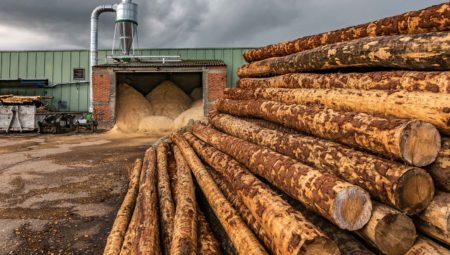It will be the first plant in the world where ‘green fuel’ will be produced and further processed in a refinery for motor vehicles. This plant will convert roughly 35,000 – 40,000 tons of dry wood residues into oil each year using pyrolysis technology. This oil is then processed in a refinery to produce advanced biofuels. With the produced pyrolysis petrol an equivalent of 15,000 family cars can be powered per year.
The biofuel is mixed with other types of fuel – biofuels as well as fossil fuels – resulting in a petrol and diesel that is partly composed of sustainable oil. This ensures that it will comply with the European RED II directive under which, starting in 2020, petrol must contain a certain fraction of renewable energy from sustainable sources such as wind, sun, and biomass.
‘Non-fossil, non-food’
The process used to convert the residual waste materials into oil is called fast pyrolysis, and it produces a ‘green’ sustainable product that can be used to replace fossil oil. It is a ‘non-fossil, non-food’ oil. As the oil is made from residuals, no trees need to be cut down and no agricultural land needs to be converted from producing food to producing raw materials for fuel.
“Interest in this new type of bio-oil is skyrocketing; an increasing number of companies are convinced that pyrolysis oil is an excellent alternative for fossil oil”, explains Gerhard Muggen, managing director of BTG-BTL.
BTG-BTL and TechnipFMC have previously been awarded an order for building one production facility in Finland, with the possibility of extending to four. Here sawdust is converted into pyrolysis oil, which is then used to provide energy for various factories in Finland and the Netherlands.
Delivery in 2021
The Swedish joint venture Pyrocell, consisting of the wood industry company Setra and the oil company Preem, will be utilising this new technology. Construction of the pyrolysis facility is scheduled to start this year and is scheduled to start production during 2021. Zeton, which like BTG-BTL is based in Enschede, will manufacture the core units of the pyrolysis plants, providing 100 full-time jobs for workers in the Netherlands.
The production plant will be built on the company grounds right next to the Setra Kastet sawmill in Gävle (photo), about 170 kilometres north of Stockholm. The necessary raw material in the form of sawdust is already available eliminating the need for further transport. The oil produced is then processed in Preems refinery in Lysekil, on the Swedish west coast.
Pontus Friberg, chairman of Pyrocell, says: “We opted for the combination of TechnipFMC and BTG-BTL after evaluation of other technologies and offers available in the market. The reference plant in the Netherlands, the Empyro-project, has played an important role in our decision making.” Empyro produces oil used to provide energy for the global dairy company FrieslandCampina production facility located in Borculo in the Achterhoek.



